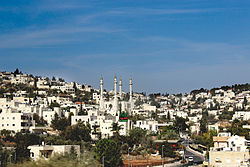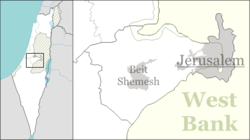Abu Ghosh
Abu Ghosh
|
|||
|---|---|---|---|
 |
|||
|
|||
| Location within Israel | |||
| Coordinates: 31°48.288′N 35°6.744′E / 31.804800°N 35.112400°ECoordinates: 31°48.288′N 35°6.744′E / 31.804800°N 35.112400°E | |||
| District | Jerusalem | ||
| Founded | 16th century | ||
| Government | |||
| • Type | Local council | ||
| Area | |||
| • Total | 2,500 dunams (2.5 km2 or 600 acres) | ||
| Population (2015) | |||
| • Total | 6,978 | ||
Abu Ghosh (Arabic: أبو غوش; Hebrew: אבו גוש) is a local council in Israel, located 10 kilometers (6.2 mi) west of Jerusalem on the Tel Aviv-Jerusalem highway. It is situated 610–720 meters above sea level. It takes its current name from the dominant clan inhabiting the town, while the older Arabic name used to be Qaryat al-'Inab ("Grape Village").
The old Arabic name of Abu Ghosh, Qaryat al-'Inab ("Village of the Grapes"), has led to its identification with the biblical site of Kiryat Ye'arim, known in English as Kiriath-jearim (Hebrew meaning: "Village of Woods"), the town to which the Ark of the Covenant was taken after it had left Beth-shemesh.
The village has also been associated with Anathoth, the birthplace of the prophet Jeremiah.
Abu Ghosh is located in one of the earliest areas of human habitation in Israel. Archaeological excavations have revealed three Neolithic settlement phases, the middle phase is dated to the 7th millennium BCE.
Legio X Fretensis of the Roman army had a station house in Abu Ghosh until the end of the 3rd century CE.
The Crusaders, who called the village Fontenoid, thought for a while that this was the site of Emmaus mentioned in the Gospel of Luke. For the church they built here see here or further down under "Benedictine monastery".
There are several versions on the origins of the Abu Gosh clan:
The Abu Gosh family controlled the pilgrimage route from Jaffa to Jerusalem, and imposed tolls on all pilgrims passing through. They were given this privilege during the sultanate of Suleiman the Magnificent (1494-1566). The churches in Jerusalem also paid a tax to the Abu Ghosh clan. In 1834, during Egyptian period in Palestine, the Egyptian governor Ibrahim Pasha abolished the Abu Ghosh's right to exact tolls from the pilgrimage route and imprisoned the clan's chief, Ibrahim Abu Ghosh, leading to the clan's temporary participation in the countrywide Peasants' Revolt. As a result, Abu Ghosh was attacked by Egyptian military forces. It was attacked again in 1853 during a civil war between feudal families under Ahmad Abu Ghosh who ordered his nephew Mustafa to go to battle. A third attack on Abu Ghosh, carried out by the Ottoman military forces, helped and executed by British forces, took place during the military expedition against the feudal families in the 1860s.
...
Wikipedia



